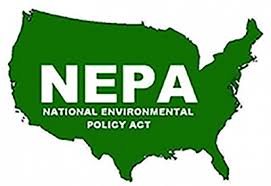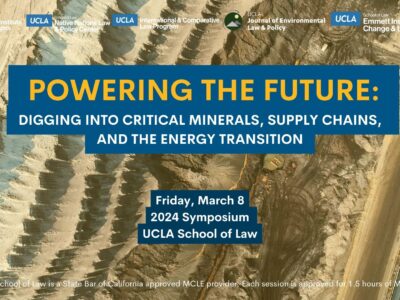Energy
Ranking the Candidates’ Focus on Energy & Climate
Some campaign websites mention these issues only in passing. Others went into more detail.
I thought it would be helpful to provide some kind of objective measure of how much various candidates focus on energy and climate. I based this on how extensively they discuss these issues on their websites. By this ranking, Biden came in first — surprisingly, ahead of progressives Jill Stein and Cornel West. Also surprisingly, …
Continue reading “Ranking the Candidates’ Focus on Energy & Climate”
CONTINUE READINGWill the NEPA Amendments Speed Up Permitting?
Probably not much. If at all.
I’ve blogged quite a bit about the challenges of interpreting the NEPA amendments, which snuck through as part of last year’s debt ceiling bill. I haven’t said much about their impact. Given the amount of energy infrastructure we need to build in the near future, a streamlined permitting process would be great. Alas, I don’t …
Continue reading “Will the NEPA Amendments Speed Up Permitting?”
CONTINUE READINGNew Bill Takes Up Local Oil Drilling Phase-Outs
Oil and gas interests want to weaponize new case law from the California Supreme Court. AB 3233 would clarify the scope of local authority over drilling operations.
When the California Supreme Court ruled last August that Monterey County could not enforce its voter-approved ban on new oil and gas wells, lawyers for Chevron said the company was “pleased” to end the 7 years of litigation. Monterey County is home to the eighth-largest oil field in California, so there was plenty at stake …
Continue reading “New Bill Takes Up Local Oil Drilling Phase-Outs”
CONTINUE READINGCritical Insights on the Mineral Boom: Part III
On the rise of resource nationalism and building an equitable supply chain: Insights from the Emmett Institute’s “Powering the Future” symposium.
The topic of critical minerals and the energy transition is one of choices and priorities, at least according to author and journalist Ernest Scheyder, who spoke at the second panel in our recent “Powering the Future” symposium. This panel, Critical Minerals and Global Supply Chains, discussed some of the fundamental choices that governments, industry, and …
Continue reading “Critical Insights on the Mineral Boom: Part III”
CONTINUE READINGThe Changing Politics of Coal
Coal has gone from a national conservative rallying cry to a niche state concern.
The “War Against Coal” was a major conservative theme eight years ago. Now it seems almost forgotten even by Donald Trump, who was once coal’s caped crusader. But although protecting coal production is no longer much of a national issue, keeping coal-fired power plants open has percolated as an issue at the state level. It …
Continue reading “The Changing Politics of Coal”
CONTINUE READINGReplacing McConnell
If the GOP flips the Senate, who will lead them on environmental issues?
Who will lead the Senate in 2025? The odds are that it will be a Republican. Democrats have a slim margin and face some close races, while all the GOP seats seem secure. That makes the question of who will replace Mitch McConell as GOP leader all the more important for climate and energy policy. …
Continue reading “Replacing McConnell”
CONTINUE READINGHow to Cooperate with China on Climate
A conversation with Joanna Lewis about what has worked, and what hasn’t, when it comes to bilateral climate cooperation with China.
China is the world’s largest producer of both CO2 emissions and green technology to cut those emissions. It installed more solar panels last year than the U.S. has in its history, and yet keeps building coal-fired plants too. And Chinese officials just announced that the country will accelerate the construction of solar, wind and hydropower. …
Continue reading “How to Cooperate with China on Climate”
CONTINUE READINGDeciphering NEPA 2.0
Here’s everything you wanted to know about the “New NEPA” but were afraid to ask.
NEPA was long an island of legal stability, standing almost unamended for over a half century. Then in the summer of 2023, everything changed. As a rider on the agreement to raise the debt ceiling, Congress extensively rewrote and expanded NEPA, gifting us with a new statutory regime. As I’ve written before — and discuss …
Continue reading “Deciphering NEPA 2.0”
CONTINUE READINGActually, EV Sales Are Right on Track
Don’t believe the current anti-EV spin.
There is a lot of talk about weak consumer demand for EVs — doleful from greens, triumphant from others. Maybe US carmakers have hit a few speed bumps –not surprising when trying to rapidly ramp up a product that’s new to most consumers. But the reality is actually quite reassuring in terms of the U.S. …
Continue reading “Actually, EV Sales Are Right on Track”
CONTINUE READINGMisusing Carbon Removal as a Climate Response
Carbon removal is an alluring idea. That also makes it a tempting façade for bad policies.
It seems clear that in some form, carbon removal is going to be an important component of climate policy, especially later in the century to deal with carbon levels that overshoot the targets in the Paris Climate Agreement. The problem is not with the concept but with its misuse. One of the risks that …
Continue reading “Misusing Carbon Removal as a Climate Response”
CONTINUE READING












